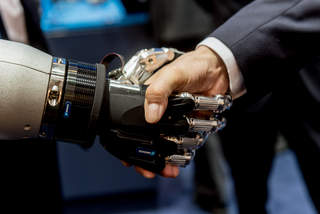
© Christian Kruppa
German-Dutch innovation and technology pact
The pact focuses on all key emerging areas such as digitalisation, Industry 4.0, energy and climate, mobility and health industry. The agreement builds on the results of the German-Dutch intergovernmental consultation held in October 2019. The innovation pact was signed on the German side by the BDI and the Ministry of Economic Affairs and, on the Dutch side, by the Ministry of Economic Affairs and Climate Policy, the Foreign Ministry, the industrial association VNO-NCW, the technology association FME, and the high-tech association HTSM.
Germany and the Netherlands look back on a long tradition of close economic relations. There are not many other countries in the world between which cooperation is such a matter of course and as mutually beneficial. The Netherlands is Germany’s most important European and, globally, second biggest trade partner after China. The potential for collaboration in fields of innovation is therefore also high. The close cooperation between the two countries will enable both countries to accelerate the development, testing and application of technological solutions. This will, in turn, unfold considerable growth potential for both countries and for the EU as a whole.
The start of a strategic dialogue
The Dutch royal couple visited Berlin in July 2021. On this occasion, the first official meeting of the partners after the signing of the pact took place. The aim of the meeting was to formulate the next steps to implement the innovation pact and to set up a structured dialogue between the partners. The participants agreed to commence dialogue in the field of microelectronics and discuss challenges facing the industry with stakeholders from the semiconductor industry with a German-Dutch roundtable on European Open Strategic Autonomy and Microelectronics. The EU must respond to changes in the international environment by redefining its global geostrategic position to strengthen its resilience. This is precisely the objective of the European Commission’s proposed EU Chips Act.
The innovation pact will also address further issues this year. A virtual German-Dutch webinar is scheduled for June this year, on the third Digital Day 2022, to discuss further opportunities for collaboration in the area of german Reallabore and dutch Fieldlabs and the required political parameters to make regulatory sandboxes work effectively in practice.
Furthermore, the second German-Dutch Roundtable on Strategic Autonomy and Microelectronics will also take place in June 2022 in Berlin.



